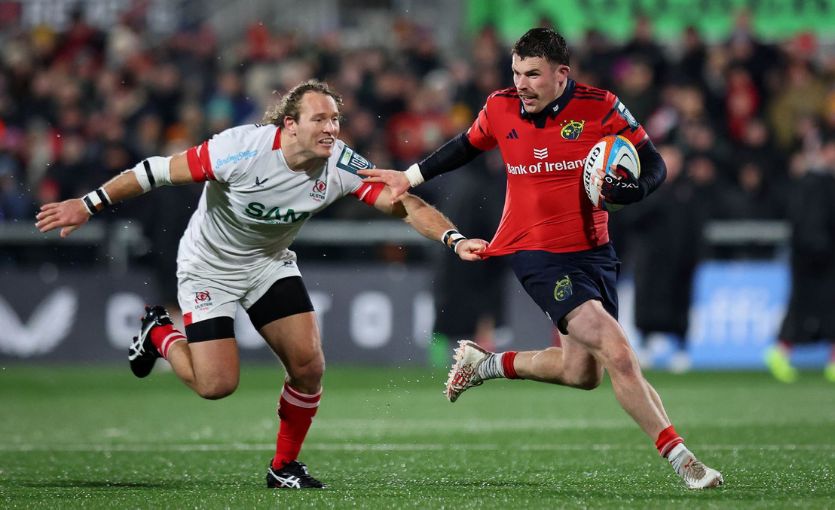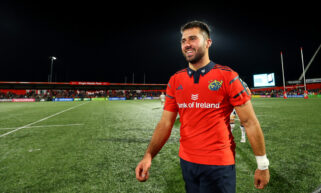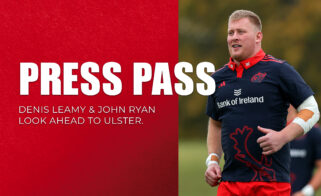Croke Park Embraces ‘Foreign’ Guests With Old Reservations
9th February 2007 By Munster Rugby

Rugby’s debut at the GAA’s home has sold out but some still see it as heresy, writes Lawrence Donegan in yesterday’s Guardian Newspaper.
It is the one they have all been waiting for, at least in Michael Greenan’s household -at 1pm this Sunday, at Cusack Park, Mullingar, it is Loughrea versus Cushendall in the semi-final of the all-Ireland senior club hurling championship. “That’s where I’ll be. Why would I want to be anywhere else?” says the vice-president of the Gaelic Athletic Association.
If it was possible to detect a note of defiance in Greenan’s voice, then it was just as easy to understand why he might be on the defensive over his choice of event on what will be a momentous weekend for Irish sport. While he and the hurling fans of Loughrea and Cushendall will be making their way home from Mullingar after Sunday’s match, the rest of the country will be turning their attention to events at Croke Park in Dublin, home of the GAA, where Ireland take on France in the Six Nations. The continuing renovation of Lansdowne Road means that England will also visit Croke this month.
The matches are of great importance to Ireland’s hopes of establishing themselves as the best team in the northern hemisphere in the run-up to the World Cup but are of ever more profound significance for the GAA and the cultural history of Ireland. When Eddie O’Sullivan’s and Bernard Laporte’s men walk out in front the 82,000 crowd on Sunday their presence on the Croke Park pitch will mark the end of the GAA’s Rule 42, which has banned the playing of “foreign” sports on GAA pitches for over a century. “We’re excited but nervous too, because we don’t know what kind of response we’ll get,” says O’Sullivan about the prospect.
The large majority of O’Sullivan’s countrymen share his excitement – tickets for Sunday’s match sold out months ago – but there are some who believe that allowing rugby to be played at GAA headquarters is a betrayal of everything the organisation stands for and a dangerous precedent which may threaten the future of Ireland’s indigenous games, Gaelic football and hurling.
“Say you were Tesco and Sainbury’s couldn’t open for some reason and they came to you and said, ‘Can we sell our groceries at your shop?’ You would tell them to get lost, of course you would,” argues Greenan. “The GAA should have said the same to rugby.”
Supermarket metaphors don’t often find their way into sporting debates but then cultural politics and sport are seldom as intertwined as they are in Ireland. When the GAA was established in 1884 its principal aim was to promote Irish sports. But its founder, Michael Cusack, also wanted it to be a bulwark against the anglicisation of Irish society.
“Cusack was a fervent nationalist and promoter of Irish culture, and that came through in the way the GAA operated. Only Irish music could be played at GAA functions, GAA teams could only wear strips that were manufactured by Irish companies and no ‘foreign’ sports were played on GAA pitches,” explains Marcus de Burca, who wrote the official history of the association in 1980. “For their part the British saw the GAA as an extremely dangerous political organisation.”
The GAA’s enmity to all things British was intensified when British soldiers killed 13 people at a Gaelic football match at Croke Park in 1920. Cusack’s stipulations remained intact until 1971, when the GAA decided to rescind its ban on its players taking part in “foreign” sport. Mick Galwey, who won an all-Ireland Gaelic football medal with Kerry in 1986 and went on to captain the Irish rugby team, is the most famous example of a player who benefited from the lifting of this ban. Kevin Moran, who won the FA Cup twice with Manchester United and two Gaelic football all-Irelands with Dublin, was another.
Rule 42, however, remained in place until 2005, although what the association deemed a foreign sport was liberally interpreted: Muhammad Ali boxed at Croke Park and American football games were played there too. “The rule was primarily used to keep ‘English’ sports – rugby, soccer and cricket – out,” explains De Burca
An attempt to rescind the rule was narrowly defeated in 2001, but when the issue was debated again in 2005 proponents of allowing the Irish Rugby Union and Football Association of Ireland to use Croke Park while Lansdowne Road was being renovated narrowly won the necessary two-thirds majority. “The view was it was time to move on. We live in a different age. Ireland is a multicultural society” says Tommy Kenoy, a member of the GAA’s central council.
Kenoy rejects the argument put forward by the likes of Greenan that allowing rugby internationals to be staged at Croke Park is promoting other sports at the expense of the GAA’s own. “They said exactly the same in 1971, when they allowed our people to take part in foreign sports, and the exact opposite occurred. The GAA thrived back then and I think the same will happen this time round.”
That is debatable. What isn’t up for dispute is that inviting rugby fans into Croke Park will make the GAA large sums of money. The organisation stands to make about €2m (£1.32m) from Sunday’s match and the same again when England come to visit later in the month. “That money can be put to good use around the country by the GAA,” says Kenoy.
This is a powerful point, but even so it doesn’t match the persuasive power of the north Dublin skyline where Croke Park rises above the terraced rows as if hewn from Steven Spielberg’s Hollywood imagination. A Gaelic football and hurling ground it may be, but it is also a monument to the ingenuity of human engineering and the emotional pull of sport. “It is time to show the rest of the world the best of Ireland,” says Mick Galwey. “And Croke Stadium – a magnificent stadium – is most definitely the best of Ireland.”



